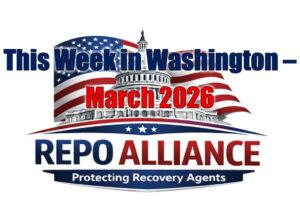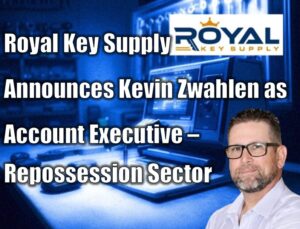Brazil Launches Self-Help Repossession – A Blue Ocean Opportunity for the Brave?
The nation of Brazil has just taken its first steps into the self-help repossession process. With an auto loan portfolio larger than Canada and only a handful of known auto repossession companies, this emerging market could be promising. But before planning on sitting on the Copa Cabana and sipping caipirinhas under the balmy Rio nights, there are some things to know.
Baby Steps
Brazilian banks have just begun the first out-of-court (self-help) repossessions through a pilot project in Mato Grosso do Sul, (an inland state of 2M east of Sao Paulo) where the State Department of Transit (Detran) has already issued regulations, saw five vehicles enrolled, with four cases resolved. Two through negotiation and two through actual repossession.
Prior to this, lenders had to go through the legal system to repossess vehicles. This opening of the repossession process is expected to be significantly cheaper and faster for the banks with the potential consumer benefit coming in the expected form of looser underwriting and lower rates.
The proposed guidelines include a 20-day notice to the borrower days to renegotiate. If the debtor does not approach the creditor, a “circulation restriction” is imposed and the repossession enabled.
But here’s another catch; Repossessions are only allowed between the hours of 6 am to 6 pm, no weekends and no holiday. This cuts operational flexibility by over 50% compared to U.S. norms.
In January guidelines for self-help repossession were requested from Brazil’s 26 states from Detrans (National Department of Transportation), granting 90 days for these state agencies to release their rules. Mato Grosso do Sul was the first to do so.
Brazil’s banks, eager to expand this, are proceeding cautiously, ensuring all stages of the process are well-established to avoid aggressive actions and potential legal challenges.
In this process, aside from the registry, the banks can also hire skip tracers specialized in finding vehicles. Unlike judicial repossessions, which require a court officer’s presence during seizure, Bank representatives or their assignees will be able to go to the vehicle’s location and repossess it but requiring the debtor to sign a document.
It is assumed that lenders will be doing the bulk of this, much like in the US until about the year 2000, with collectors doing it themselves and sometimes bring a tow truck driver. Very old school. Probably too old school to tackle the demands of the potential volume.
A High-Stakes South American Prize
Picture a sprawling nation with 12 million financed vehicles, backed by an estimated $85 billion in loans from titans like Santander, Banco do Brasil and Itaú Unibanco with 4% to 6% delinquency ratios and up to 720,000 delinquent loans awaiting recovery. Brazil may be on the brink of a repossession boom.
The new Marco Legal das Garantias (Legal Framework for Guarantees) (Lei nº 14.711/2023) and Contran Resolution nº 1018/2025 is the new law hoping to turbocharge the repossession process and slash judicial red tape by mirroring the U.S.’s self-help playbook.
For American repossession powerhouse companies with the patience and capital, this is could be a multimillion-dollar investment siren call if they can employ American technology and experience.
Could Brazil, ranked 5th or 6th globally, 2nd in the Western Hemisphere, and 1st in South America become the repossession industries next frontier?
U.S. Tech Titans vs. Brazil’s Big Banks
The American repossession industry is unrivaled in scale to Brazil’s small market and has much to offer. LPR, advanced recovery database networks and for lenders looking to enhance assignment efficiency, repossession forwarders if employed in a growing market could find a responsive lending community.
There are only two advertised sources for repossessions in the entire nation of 212 million that I have been able to find; ODEEN Veicular (60,000 reported historical total recoveries per their website) and OMNIHUNTER. It can be assumed that many tow companies and a patchwork of locals will be hired. This creates some compliance and risk issues that resemble much of the non-professional industry performing repossessions in the US.
To avoid such risks, lenders may need some help. Enhancing the vast experience of the US repossession industry through compliance training could help foster a positive relationship and assure the new Brazilian industry does not devolve into a gang ridden free for all process like in Malaysia.
Fine tuning processes for the new market and translating from English to Brazilian Portuguese, American firms could probably bring skip tracing, compliance training, recovery platforms and LPR into the equation and have them up to speed relatively quickly.
Stumbling Blocks in Brazil’s Backyard
Despite these strengths, there is a minefield of weaknesses that could trip up American entrants. Brazil’s regulatory maze requires a local director, CNPJ tax ID, and Detran accreditation under Portaria Detran, differing from U.S. state licensing, challenging firms used to simpler rules.
Culturally, Brazil’s discreet repossession ethos clashes with America’s logo’s on the doors and flashy repo culture, demanding subtlety over bravado. The new law’s operational limits of 6 am to 6 pm, no weekends or holidays, severely restrict U.S. firms’ flexibility, accustomed to round-the-clock operations that maximize recovery windows, especially when debtors are off-guard.
Language gaps and rural debtor tactics (e.g., hiding cars) blunt LPR’s urban bias, while Brazil’s weaker real (Brazil’s currency = 5 BRL = @ 1USD) and high setup costs (legal fees, local hires) squeeze margins below U.S. norms ($400 per repo).
Without local allies in lending, potential U.S. firms risk floundering in a market where the nation’s largest lenders will prefer to use trusted locals.
An $85 Billion Playground for U.S. Repo Innovation
Brazil finances about 2.4-2.5 million vehicles and as South America’s top auto lending market (1st regionally) and a global contender (5th or 6th) underscores its potential. The new law’s opens a goldmine. U.S. self-help expertise fits like a glove, offering banks like Santander Brasil (25% market share, 2nd in the Western Hemisphere behind the U.S.) faster returns on their $6-8 billion portfolio.
Retooling their tech, LPR providers could license tech to ODEEN Veicular or OMNIHUNTER, while recovery database providers could localize and outpaced Brazil’s repo tech lag which does not appear to maintain anything to rival the scale and capacity to rival.
Partnerships with Tecnobank or Mato Grosso do Sul’s accredited trio could unlock Detran networks, tapping a market where repossessions could hit U.S. level millions if restrictions improve. As financing grows (40-60% for new cars), so does the delinquency pool and with it the opportunity to become market disruptors.
Piranhas of Progress and Economic Wildcards
Threats to succeed in Brazil loom large. Locals may already hold ground with bank contracts, leveraging lower costs and local savvy to counter the value of US market entrants.
The 6 am to 6 pm restriction, with no weekend or holiday work, slashes operational windows—unlike the U.S., where night and weekend repos exploit debtor availability, potentially doubling recovery timelines and costs.
Economic volatility; an 11% unemployment rate, a shaky real or spikes in defaults could tighten lending and overwhelm existing logistics. Like in the US, LPR falters in Brazil’s rural expanse and adapting to Mercosur plates could hike costs and time to market.
U.S. styled centric designs and technology require pricey retooling. American firms risk overreach if lenders fail to adopt the new entrants to the market and double down on homegrown solutions, sidelining foreign interlopers in this top South American market.
Strategic Stakes in Brazil’s Repossession Future
Brazil holds massive potential and for some could be a tantalizing prize with its estimated 600,000 units ready for recovery. Bringing or expanding LPR and American repo tech to the stage could transform this market and create a massive upswing for the right players at the right time.
Yet regulatory tangles, local rivals and operational limitations require finesse to fit in. Opportunities to partner with the locals offer the greatest opportunity to the market with the least resistance, blending American repo tech with Brazilian roots.
This isn’t a reckless dash but a strategic stake: enter smartly, align with local players, and claim a slice of Brazil’s repossession revolution before the window narrows. The prize is real; the path requires precision.
Many years ago, I read a book called “Blue Ocean Strategy” which explored studies on the simultaneous pursuit of differentiation and low cost to open up new market spaces and create new demand. The opposite of a Blue Ocean is a Red Ocean, bloody and swarming with competitive sharks, like the repo industry in the US. While in its infancy, this may be as blue an ocean as exists in the repo industry at this time.
But this ocean may already have sharks of its own. KAR Global is just that, global and may already be eyeing or exploring this market for PAR. DRN’s parent company Motorola has been operating in Brazil for almost fifty years.
As far as American Repossessors go, unless you’re a native Braziliano speaking fluent Portuguese and are familiar with the culture, multiple layers of police and can navigate the dangerous flavelas, forget it.
And before any agency owners start taking Rosetta Stone Brazilian Portuguese lessons and shipping wheel lifts to Sau Paulo hoping to open their own shop, be sure to do your homework. Think twice. This ain’t Texas.
Kevin Armstrong
Publisher
Related Stories:
Irish Repo Men Forced to Get Naked into Pen with “Agitated” Boar
Source: Valor International and Grok AI data research











More Stories
Colorado Bill Aims to Severely Impact All Repossession Operations
Today is Fallen Agents Day – 2026
From Auction Cutting to Field Programming: The Structural Shift No One Budgeted For
Bad Apples in the Repossession Industry
Why Self-Help Repossession Is Taken for Granted — and Why Losing It Would Hurt Consumers Most
A Necessary Distinction: Financial Oversight vs. Financial Control